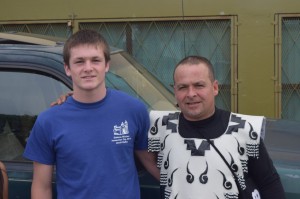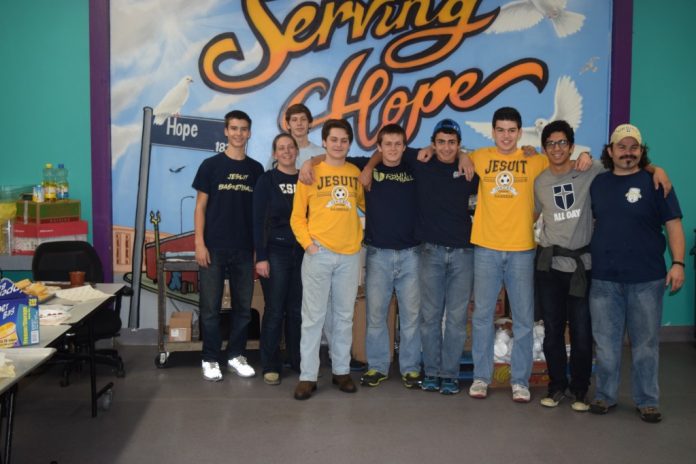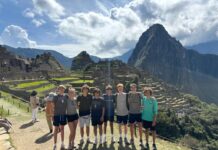A handful of students flew to Los Angeles, California to participate in the Dolores Mission Trip. These select few students slept on the floor and spent all day dedicating themselves to serving the community. The trip is one of the few domestic immersion trips that Jesuit Dallas sponsors and is also one of the most culturally shocking. When walking around the neighborhood, the students were followed by a cruiser and an officer at all times. They spent times in areas of low-income housing, places that are replete with homeless people. Much of the trip was spent in community centers where people went to get away from the gang life or the drugs from the street. This trip takes relatively well-off kids, and places them in the shoes of those less fortunate. It is both a shocking and humbling experience.
However, the people were extremely kind and wanted to share their stories with the students, both through poems and raps. “These poems were graphic” according to Anthony Mattachione, Director of Community Service. The graphic subject matter only added to the effectiveness of the experience.
 According to Mattachione, being placed in uncomfortable situations is an important part of the immersion process, as it expands the students’ minds beyond their personal experiences. “The shock factor was more the fact that there were a group of strangers was to tell them how they felt, because at one time there may have been some negative feelings towards strangers or they thought there was something up. Why do they want to know so much about me? Will they see me as less of an individual? This project opened up their eyes by letting them see that different does not mean less.”
According to Mattachione, being placed in uncomfortable situations is an important part of the immersion process, as it expands the students’ minds beyond their personal experiences. “The shock factor was more the fact that there were a group of strangers was to tell them how they felt, because at one time there may have been some negative feelings towards strangers or they thought there was something up. Why do they want to know so much about me? Will they see me as less of an individual? This project opened up their eyes by letting them see that different does not mean less.”
Sharing is a large part of the immersion as it’s the only way to know where someone else is coming from, and what their experiences have been. All of the people who told these stories came from much rougher backgrounds, backgrounds of abuse and drug use. Hearing about people’s struggle with these real life issues is a reality check that serves to not only humble but to give some perspective as to what life is like outside of our bubble. Walking down the street and seeing a drug deal go down, or seeing an actual gang on their turf is not something you see in Dallas, and took the kids by surprise when they began to see it every day.
“A lot of our boys have seen differences in their own community, and their eyes have been opened,” said Coach Matta. Now obviously there isn’t as much drug trade and gang life in Dallas as there is in L.A but it doesn’t mean that there isn’t any. Noticing that this stuff is going on around where you live is the first step to trying to stop it from happening.
A day on the mission trip started with waking up on the floor of a school conference room. After moving all of the tables and chairs back to their normal positions, students headed out to wherever they were going to spend the day. For instance, they toured Homeboy Industries, a place that offers free classes to those in the community who need an education. They also helped out at the Dolores Mission “Underwings Program.” Additionally, the students went to a Homeboy Industries street poet event where they heard recovery stories in the form of rap and poetry.
The group visited a series of impoverished areas in Los Angeles, exploring the three different types of poverty in L.A. There were some kids who had the option to avoid gang life, some who didn’t avoid it and were impoverished or in a gang, and some from Homeboy Industries who had done some unforgivable things but were able to find peace in the program. The program gives people an outlet to let out their personal frustrations with their lives creatively, through poetry or music.
“There was a guy who pistol-whipped this guy in front of his kids to rob him, but when he told us about it we weren’t scared because he was reading a poem he had written about how he had changed his life,” said Bruno Brenes ’16. He added, “we heard some interesting stories” which refers to the very real and graphic recovery stories of some of the people they met.
Mr. Mattachione and Mrs. Progar hope to expand the program even further, saying that they are thinking about the possibility of doing it twice a year or in the summer. As for now, the program is steadily growing and will certainly become an annual occurrence.






